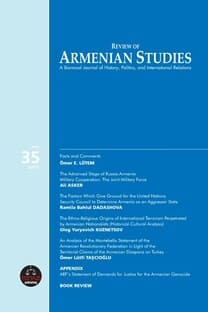(HOLLANDA'DA YAŞAYAN ERMENİLERİN VERİLERİ: EĞİTİM, İKAMETGAH VE DOĞUM YERİ HAKKINDA İSTATİSTİKLER)
THE ARMENIAN DIASPORA IN THE NETHERLANDS: STATISTICS OF EDUCATION, RESIDENCE, AND PLACE OF BIRTH
___
24 April Comité, http://www.24april.nl/ (last visit: 05/03/2016).Abovian: Armenian Cultural Association in The Hague, http://www.abovian.nl/ (last visit: 05/03/2016).
Anderson, Benedict. Imagined Communities: Reflections on the Origins and Spread of Nationalism, 2nd edition. London, 1991/1983.
Breisach, Ernst. Historiography: Ancient, Medieval, and Modern, Third Edition. Chicago, 1983/2007.
Ersaydı, Alper. "Psiko-Tarih Bağlamında Türkiye-AB İlişkileri". Politik Psikoloji Yıllığı, Volume: 1 (Ankara, 2011).
Federatie Armeense Organisaties Nederland (FAON). http://www.faon.nl/ (last visit: 05/03/2016).
Federatie Armeense Organisaties Nederland (FAON). Armeniërs in Nederland: Een verkennend onderzoek. The Hague, 2008.
Feigl, Erich. Armenian Mythomania, Armenian Extremism: Its Causes and Historical Context. Vienna, 2006.
Geary, Patrick J. The Myth of Nations: The Medieval Origins of Europe. Princeton, 2003).
Gellner, Ernest. Nations and Nationalism. New York, 1983. Hobsbawm, Eric & Terence Ranger. The Invention of Tradition. Cambridge, 1983.
Krieger, Heike. The Kosovo Conflict and International Law: An Analytical Documentation 1974-1999. Cambridge, 2001.
Luckham, Robin. "French militarism in Africa". Review of African Political Economy, Volume: 9, Issue: 24 (1982), 55-84.
Luyten, Hans. "Stability of school effects in Dutch secondary education: The impact of variance across subjects and years". International Journal of Educational Research, Volume: 21, Issue: 2 (1994), 197-216.
Smith, Anthony D. Nationalism and Modernism. New York, 1998/2003. Toynbee, Arnold J. A Study of History. Oxford, 1939.
Toynbee, Arnold J. Een Studie der Geschiedenis. Bussum, 1952. University of Amsterdam (UvA). http://www.uva.nl/over-de-uva/organisatie/medewerkers/content/v/e/g.j.m. veerman2/g.j.m.veerman2.html (last visit: 05/03/2016).
Veugelers, Wiel. "Creating critical democratic citizenship education: empowering humanity and democracy in Dutch education". Compare: A Journal of Comparative and International Education, Volume: 37, Issue: 1 (2007), 105-119.
Volkan, Vamık. "Large-group Identity, International Relations and Psychoanalysis". Deutsche Psychoanalytische Gesellschaft e.V. (DGP) meeting, Gasteig Cultural Center, Rosenheimer Platz, 23 May 2008. Available online: http://www.vamikvolkan.com/Large-group-Identity%2CInternational-Relations-and-Psychoanalysis.php (last visit: 21/11/2016). (*)
Volkan, Vamık. "Large-group Identity, International Relations and Psychoanalysis". International Forum of Psychoanalysis, Sweden 2009. (*)
Volkan, Vamık. "Large-group Identity, International Relations and Psychoanalysis". vamikvolkan.com 2007/2016 (last visit: 21/11/2016). Available online: http://www.vamikvolkan.com/Large-group-Identity%2CInternational-Relations-and-Psychoanalysis.php (*)
Volkan, Vamık. "Large-group Identity: 'Us and them' - Polarizations in the International Arena". Psychoanalysis, Culture and Society, Volume: 14, Issue: 4 (2009).
Volkan, Vamık. "Transgenerational Transmissions and 'Chosen Trauma': An Element of Large-Group Identity". vamikvolkan.com 2007/2016 (last visit: 21/11/2016). Available online: http://www.vamikvolkan.com/Transgenerational-Transmissions-andChosen-Traumas.php (**)
Volkan, Vamık. "Transgenerational Transmissions and 'Chosen Traumas': An Aspect of Large-Group Identity". Group Analysis, Issue: 34 (2001), 79- 97. (**)
Volkan, Vamık. "Transgenerational Transmissions and 'Chosen Traumas'". Thirteenth International Congress of the International Association of Group Psychotherapy, August, 1998. (**)
Weber, Eugen. Peasants into Frenchmen: The Modernization of Rural France, 1870-1914. Stanford, California, 1976.
(*) The sources are used as by the author himself during the period 2007- 2009.
(**) The sources are used as by the author himself during the period 1998- 2007.
- ISSN: 1303-5304
- Yayın Aralığı: 2
- Başlangıç: 2002
- Yayıncı: Terazi Yayıncılık Basım Dağıtım Danışmanlık Eğitim Organizasyon Matbaacılık Kırtasiye Tic. Ltd. Şti.
HOLLANDA'DA YAŞAYAN ERMENİLERİN VERİLERİ: EĞİTİM, İKAMETGAH VE DOĞUM YERİ HAKKINDA İSTATİSTİKLER
MELINE TOUMANI VE TÜRKİ-ERMENİ UYUŞMAZLIĞI
GERÇEK KÜRESEL BİR SUÇ? AFRİKA VE "ERMENİ SOYKIRIMINI" TANITMA KAMPANYASI
(HOLLANDA'DA YAŞAYAN ERMENİLERİN VERİLERİ: EĞİTİM, İKAMETGAH VE DOĞUM YERİ HAKKINDA İSTATİSTİKLER)
(MELINE TOUMANI VE TÜRKİ-ERMENİ UYUŞMAZLIĞI)
(GERÇEK KÜRESEL BİR SUÇ? AFRİKA VE “ERMENİ SOYKIRIMINI” TANITMA KAMPANYASI)
(ARAM ANDONYAN, NAİM EFENDİ VE TALAT PAŞA TELGRAFLARI ÜZERİNE BİR DEĞERLENDİRME)
